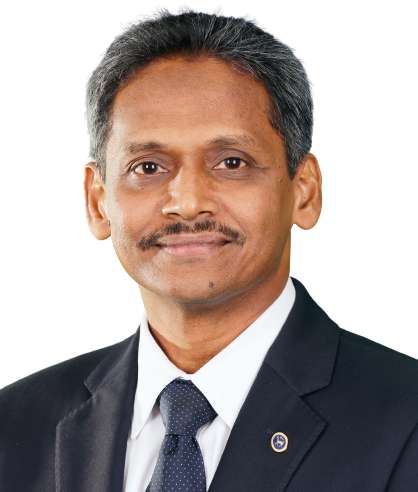Wednesday, Apr 23, 2025 | 10:00 AM - 10:30 AM
Location: Cedar Hall HQ1-1-660

OVERVIEW
The Malaysian economy has performed strongly. Growth has been broad-based, reaching 5.1 percent in 2024, with inflation remaining low and stable at or below 2 percent since mid-2023.
APD Director Krishna Srinivasan will be joined by Bank Negara Malaysia Governor Rasheed to discuss Malaysia's economic outlook and risks – particularly given recent tariff measures and their global impact – as well as monetary policy management, ongoing structural reforms, and policy strategies with a view to drawing lessons for emerging market economies. Key priorities of Malaysia’s 2025 ASEAN Chairmanship will also be discussed.
The session will be attended in-person by IMF Spring Meeting delegates, investors, press, representatives from civil society organization, and staff. The fireside discussion will be live-streamed on IMFConnect, IMF’s official YouTube channel.
REPORT
Key Points:
Quotes:
“We need to really adopt a different communication approach to really educate the public [about] why is it important for us to manage inflation while it is still low, because the cost of higher inflation or unanchored inflation is very costly to the people, to the public citizen.” Abdul Rasheed Ghaffour
“We have enhanced the payment connectivity within ASEAN. So, with this tool, it will enable integration to happen at all levels, not just at the corporate level, but also at the household and SMEs level, where anyone in Malaysia or in Cambodia, for example, can promote their products to the region and sell their products and make payment instantly.” Abdul Rasheed Ghaffour
Contributors: Maria Lucia Guerra Bradford, Artem Biriukov
SPEAKER

Abdul Rasheed Ghaffour
Governor of Bank Negara Malaysia
Dato' Seri Abdul Rasheed Ghaffour is the 10th Governor of Bank Negara Malaysia. He was appointed for a five-year term effective 1 July 2023. In his role as Governor, Rasheed also serves as the chair of the Bank’s Board of Directors, Monetary Policy Committee and Financial Stability Executive Committee.
Rasheed joined the Bank in 1988 and has helmed various positions across the breadth of the Bank’s primary functions. These include monetary policy and economics, international reserves management and financial markets, financial sector development, and banking regulations. In 2016, he assumed the role of Deputy Governor.
Rasheed has also played a leading role in driving the Bank’s advocacy efforts on economic affairs, including in the areas of social protection and labour market reforms. This includes to support and advise the Government on issues relating to the management of the pandemic. He also played key roles in the development and implementation of the Financial Sector Masterplan and Financial Sector Blueprints.
At the international level, Rasheed has served and been a member of various international platforms, such as the Islamic Financial Services Board and Bank for International Settlements. He has also championed various efforts to strengthen regional financial integration and cooperation, such as the ASEAN Banking Integration Framework. Previously, he also served as the Alternate Executive Director of the Southeast Asia Voting Group Office of the International Monetary Fund.
Rasheed attended St. John’s Institution in Kuala Lumpur, prior to obtaining his Bachelor of Economics from Universiti Malaya. Rasheed also holds a Masters of Business Administration from Saïd Business School, University of Oxford.
MODERATOR

Krishna Srinivasan
Director of the Asia and Pacific Department, IMF
Krishna Srinivasan is the Director of the Asia and Pacific Department (APD). In this capacity, he will oversee the institution’s work on all countries in the Asia-Pacific region. He was previously a Deputy Director in APD, overseeing the work on several systemically important countries, including China and Korea. Prior to that, Krishna was a Deputy Director in the Western Hemisphere Department (WHD), where he oversaw the institution’s work on several countries in the Americas, including Brazil, Canada, Mexico, Peru, Ecuador and the island economies of the Caribbean, the department’s research activities, and its flagship product, Regional Economic Outlook (REO) for Latin America and the Caribbean. He is a co-editor of two recent books: Brazil—Boom, Bust and the Road to Recovery; and Unleashing Growth and Strengthening Resilience in the Caribbean. Before joining WHD, Krishna was the IMF’s mission chief for the United Kingdom and Israel, when he was a staff member of the European Department, and before that in the Research Department, where he led the IMF’s work on the G-20 in the context of the global financial crisis. In the context of this work, he and was the editor of an IMF book Global Rebalancing: A Roadmap for Economic Recovery. Krishna has been with the IMF since 1994 and has served in several departments across the institution. He secured his PhD in International Finance from Indiana University and a Master’s from the Delhi School of Economics, India, and has published several papers both at the IMF and in leading academic journals.